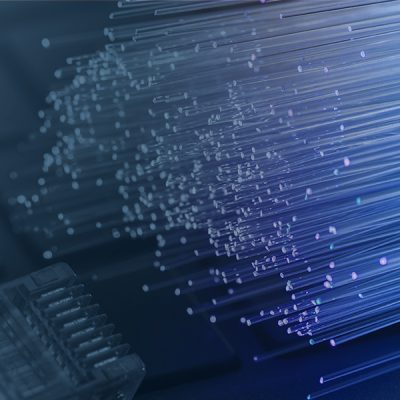The Power of Fibre
Everything you need to know about fibre Internet

“Don’t forget to get your fibre.”
Those may be familiar words from your doctor or nutritionist, but they’re just as applicable to your business Internet needs. Because fibre’s not just part of a healthy diet — it’s also the backbone to some of the most reliable Internet offerings available today.
Fibre Internet offers fast speeds and high bandwidth. And the same infrastructure behind those fibre offerings is also powering the latest Internet technology available today. That means fibre can be a critical ingredient when it comes to meeting your company’s connectivity needs.
So let’s look a little closer at what fibre is and what it offers businesses today.
What Is Fibre?
When we talk about “fibre” Internet, we’re actually talking about Internet powered by a network of fibre-optic cables. Unlike copper cables — which transfer data by carrying electrical pulses from one place to another — fibre-optic cables use threads of glass to carry pulses of light to do the same.
What sets those fibre-optic cables apart, though, is that they’re particularly good at moving data over long distances. But that’s not all that makes them unique. While copper cables have traditionally been used for DSL and cable Internet, the newer fibre-optic technology is faster — and offer users of fibre several additional benefits.
Benefits to Business
Businesses with fibre Internet are able to take advantage of a range of benefits, including:
- Speed: Fibre is fast — and that’s a good thing for most businesses. But fibre doesn’t just offer speed, it offers symmetrical speed. In other words, it provides equal upload and download speeds — helping your employees keep up with all of your business demands.
- Reliability: Because those fibre-optic cables are so much more efficient at moving data across long distances than their copper counterparts, they’re also more reliable – giving businesses an Internet connection they can count on.
- Latency: Low latency is another feature of fibre — meaning you don’t suffer the lag times that other types of Internet might come with. This is of particular importance if you’re using Voice over Internet Protocol (VoIP), relying on cloud-based applications or uploading or downloading large files regularly.
- Security: Fibre-optic cables don’t offer the same opportunity for security breaches as copper cables, making fibre Internet a more secure option than cable or DSL.
But those aren’t the only benefits fibre-optic technology offers. It also helps power 5G broadband Internet — the newest generation of Internet technology.
Fibre and 5G
Those fibre-optic cables that fuel fibre Internet are key to delivering 5G broadband to businesses across the country — creating a faster, more reliable experience for users.
As the newest generation of Internet technology, 5G is a powerful connectivity solution. And technically it’s a wireless solution. But while 5G networks can handle massive amounts of data, they also have a decreased range of coverage from traditional LTE technology. Fibre-optic cables to the fixed wireless towers help boost the 5G network, supporting its higher speeds and lower latency offerings.
In doing so, fibre-optic networks add extra reliability to 5G — creating a faster, more reliable experience for users. All while giving businesses the benefits of next-generation technology.
And that's the power of fibre.
Learn more about the fibre and 5G options available to your business. Contact one of our Client Executives today.


